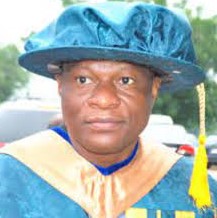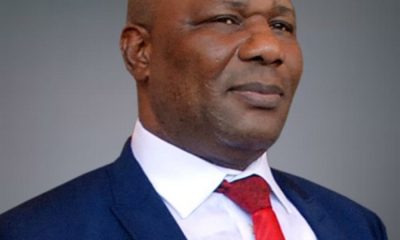Education
Why We Established Centre for Security and Legal Studies- Uni Abuja VC

The Vice Chancellor of the University of Abuja, Pro. Abdul-Rasheed Na’Allah, says the gap in use of non-kinetic approach to tackling insecurity in Nigeria prompted establishment of the Centre for Security and Legal Studies.Na’Allah said this on Tuesday in Abuja, at the inauguration of the centre and maiden symposium with the theme, “Kinetic and Non-Kinetic Application in the Fight against Insurgency.
“The vice chancellor stressed that the centre would offer courses that would be directly beneficial to the country in terms of security. He said while the use of kinetic approach by the military has played a big role in tackling insecurity, much more would be achieved if credence was given to non-kinetic approach, which involved research and development.He pointed out that “the university is central to the development of any nation and today one of the major challenges we are faced with is security.“No doubt the military is putting in its best in this regard but the academia needs to be up and doing in contributing its quota to this fight through research and development.“This is because the 21st century security challenges cannot be tackled only the barrels of the gun.“Gadgets of war may play a little part but high level intelligence is needed.“So, what this centre is trying to do is bring research into focus with regards to security,” he said.Na’Allah called on other tertiary institutions to think in the same direction as the University of Abuja, to collectively tackle insecurity in Nigeria.“It is time our nation realises that the solution to many of our challenges lies with the tertiary institutions, particularly the universities.“Even the ministries that ought to complement the effort if the universities in terms of research are no where to be found.“It is so disheartening that the various ministries both at the state and federal levels do not set money aside for research and development.“Any economy that wants meaningful development ought to set money aside for research institutions to compete in finding solutions to problems,” he said.The vice chancellor assured that the University of Abuja was ready to lead and work with relevant organisations in finding solution to the country’s problems, particularly insecurity.The Keynote Speaker at the event, Abubakar Suleiman said Nigeria was facing serious threat to its peace and security.While commending efforts of all stakeholders in finding solution to the problem, Suleiman said research and development was critical.“Security is not military force, though it may involve it, security is not traditional military activity, though it encompasses it, security is not military hardware, though it may include it. Security is development and without development, there can be no security.“It has been realised that raw military power alone cannot defeat the insurgents and other criminal elements.“Today, stakeholders and government itself are beginning to appreciate the value of the non-kinetic approach to the fight against terrorism and insurgency and has taken several steps to deploy more aspects of this strategy.“It is expected that in view of the many successes being achieved, government will intensify effort in furthering the benefits of the non-kinetic approach in this fight against insecurity in the country,” he said.The Director, Centre for Security and Legal Studies, Dr Arinze Abuah, said the centre was established to provide cutting edge degree and non degree programmes for aspiring candidates.He said programmes were carefully designed to cover the fields of legal and security concerns suitable for working class professionals.According to him, the programmes are also designed for candidates to obtain higher degree without disrupting their existing job functions.“The centre has two academic units, security studies and legal studies.“Our mission is to provide high impact programmes of studies, discussion and research that will birth implementable, sustainable and replicable solutions and ideas to address existing and emerging security and legal issues within appropriate legal frameworks.“For a start, we are rolling out six academic programmes which are mix of Masters and post graduate diplomas that include Criminology and Security Sudies, Legal Studies as well as Human Rights and Social Justice,” he said. The occasion was attended by representatives from the military and paramilitary agencies as well as other stakeholders.(NAN)Education
Stakeholders Blame Exams Body, Parents over Mass Failure

Stakeholders in the education sector said, the mass failure in the 2025 West Africa Senior Secondary Certificate Examinations (WASSCE) stem from systemic issues attributed to the examination body, parents and the students
The stakeholders spoke in separate interviews in Abuja on Thursday.
Founder, Exam Ethics Marshall International (EEMI), Ike Onyekere faulted the systemic malpractice and deep-rooted corruption within Nigeria’s examination ecosystem.
The West Africa Examination Council (WAEC) had revealed a sharp decline in performance in the 2025 SSE results compared to the previous year.
Out of a total of 1,969,313 candidates who sat for the examination across 23,554 schools, only 754,545 candidates, representing 38.
32 per cent obtained a minimum of five credits, including English Language and Mathematics.Onyechere decried the 38.32 per cent credit pass rate recorded in this year’s examinations as a “very poor result,”
He, however, noted that the decline was not unexpected due to challenges encountered during the exams.
According to him, there were serious logistical issues during the exams such as power outages, poor supervision, and lack of proper oversight which contributed to students’ poor showing.
“I am not surprised because these logistical issues, as critical as they were, they were ignored during and after the exams.
“No person talked about how those kinds of issues should be addressed in terms of how they affected the performance of those students.
“No person talked about what happened after their papers were collected from them, when they did finish their allotted time and when there was no light.
“So these are some of the questions we need to address,” he said.
Onyechere further criticised students’ growing reliance on “magic centres” and malpractice rings, arguing that many students no longer prepare sincerely for their examinations.
He said most of the students have their mind fixed on magic centres, and other forms of malpractices unfettered and with no consequences.
He accused WAEC and its sister examination body of enabling malpractice by repeatedly failing to name and shame individuals and institutions complicit in exam fraud.
“Every year, WAEC releases statements saying schools were involved in malpractices but where are the names? Who are these schools? Who are the supervisors?
“They recycle these supervisors and protect them,” he said
Citing his experience in the Federal Ministry of Education, he alleged that past attempts to publish and blacklist indicted schools and individuals were stifled.
He praised the Joint Admissions and Matriculation Board (JAMB) for its comparative transparency, saying, “at least, JAMB names CBT centres and schools caught in malpractice and takes them to court.
Onyechere admonished WAEC to take cue from JAMB, in addressing the menace of malpractices.
For meaningful change, he called on WAEC to publish names, sanction schools, blacklist corrupt officials, and take concrete action, not just about release of statements.
He also advised students to reject malpractice, rather, discover and develop their true talents.
Also, Dr Jekayinfa Olatunji, a Fellow with the National Mathematical Centre (NMC), called for a national education emergency roundtable, reforms in exam preparation strategies, and closer monitoring of learning standards at all levels.
Olatunji said until tangible solutions are implemented, the futures of millions of Nigerian students would hang in the balance.
“In 2024, no fewer than 1,805,216 students sat for waec exams out of which 1,332,089 students passed at least 5 subjects including English Language and Mathematics at credit level and above, representing 72.12 per cent pass.
“Ordinarily, the results may seem good, but, what about the remaining 27.88 per cent who didn’t get five credits with English Language and Mathematics?
“The students might not have progressed in their education that year.
“Now, the worst has happened in 2025. Out of 1,969,313 students who sat for WASSCE exams, only 38.32 per cent passed five subjects including English Language and Mathematics.
“The remaining 68.68 per cent didn’t pass five subjects including English Language and Mathematics.
“What this means is that only 754,641 students out of 1,969,313 succeeded in having scores that could earn them tertiary institution admissions,” he said
He advised the education stakeholders to take proactive steps to forestall a repeat of the woeful performance in 2026.
Similarly, a civil servant and a parent, Ijeoma Osita, attributed the poor performance in the examination to both students’ attitudes and the role of parents in fostering academic irresponsibility.
Osita decried increasing culture of academic laziness among students and misplaced priorities by parents.
She further lamented that the quality of learning was fast diminishing due to an over-dependence on technology without critical thinking and originality.
According to her, many students no longer commit themselves to studying or building academic discipline, choosing instead to rely heavily on shortcuts such as Artificial Intelligence (AI), examination malpractice, and plagiarism.
“From what I have observed, many students are not ready to go the extra mile to study, build their capacity and equip themselves academically.
“They rely so much on AI and ‘expo’. Unfortunately parents endorse the negative trend, in having their children pass exams.
“They fail to harness the potential in their children by encouraging them to study harder, or even employ extra hands to coach them in the areas of weakness.
“The parents prefer to hire “machinery,” sometimes to write exams for their children.
“Some will even encourage and finance their children to leave the school, where they have attended for years, to register them in ‘miracle centres’,” she said.
She urged parents to take more responsibility in guiding their children, stressing the importance of discipline, hard work and quality education over superficial success.
| ReplyForwardAdd reaction |
Education
WAEC, Education Ministry Resolve Result Glitch Updates Ready in 24 Hours

By Elijah Oguche, Abuja
The Federal Ministry of Education has announced the resolution of a technical issue affecting the 2025 West Africa Senior Secondary Certificate Examinations results.
The issue occurred during post-release processing in subjects where paper serialisation was implemented as part of WAEC’s exam security measures.
A statement by Folasade Boriowo, the director of press of the ministry on Thursday said the Ministry commended the West African Examinations Council for its swift response, transparency, and professionalism in resolving the glitch.
Updated results will be accessible via the result checker portal within the next 24 hours.The Ministry also appreciated the patience of affected candidates and assured the public of its continued pursuit of fairness and credibility in assessment processes.
“This development reinforces the Honourable Minister’s broader education reform agenda, which prioritizes examination integrity across all bodies under the Ministry’s supervision, particularly WAEC and the National Examinations Council (NECO). In line with this, both bodies are set to commence a phased rollout of Computer-Based Testing beginning with objective components in November 2026.
“The adoption of CBT represents a critical step toward curbing malpractice, preventing question leakages, and restoring public trust in the examination system. It is a necessary reform to ensure Nigerian students are assessed strictly on merit and that their certificates retain credibility both locally and internationally.
“Dr. Alausa emphasized that safeguarding the integrity of examinations is not optional—it is essential. Upholding high standards, he noted, protects the future of our young people and sustains Nigeria’s global reputation,” Boriowo stated.
Education
FG celebrates 17 year-old Nafisa Aminu for emerging world best in English contest

By Tony Obiechina Abuja
The federation government has commended Miss Nafisa Abdullah Aminu, a 17-year-old student from Yobe State, for emerging as the World’s Best in English Language Skills at the 2025 TeenEagle Global Finals held in London, United Kingdom.
Minister of Education, Dr.
Tunji Alausa and the Minister of State for Education, Prof. Suiwaba Sa’id Ahmed, on behalf of the Federal Ministry of Education, conveyed the federal governments commendation in a statement by the Director of Press and public Relations, Mrs Folashade Boriowo on Wednesday.Representing Nigeria through the Nigerian Tulip International College (NTIC), Miss Nafisa outshone over 20,000 participants from 69 countries, including native English-speaking nations.
Her victory is not only a personal milestone but a resounding affirmation of the Renewed Hope Agenda for Education championed by President Bola Ahmed Tinubu, which continues to empower Nigerian youth to compete and excel on the global stage.
According to the statement, “This extraordinary achievement not only brings pride to the nation but also underscores the effectiveness of the education-focused components of the Renewed Hope Agenda.
” The President’s unwavering belief in human capital development through sustained investment in the education sector is beginning to yield global recognition, as demonstrated by Nafisa’s remarkable success.
The Ministers jointly commended Nafisa for her brilliance, determination, and discipline. They described her victory as a “proud moment for Nigeria and a strong endorsement of the Federal Government’s ongoing efforts to revitalise the education sector and raise globally competitive students.”
The Ministry extends heartfelt appreciation to His Excellency, Governor Mai Mala Buni, whose visionary investment in instructional materials and education reform has created an enabling environment for students like Nafisa to thrive. This achievement is a shining testimony to the renewed collaboration between the Federal Government and sub-national governments, and a clear indication that our shared commitment to quality education is bearing fruit.
Special commendation was further extended to the Yobe State Commissioner for Basic and Secondary Education, Dr. Muhammad Sani Idriss, for his tireless efforts in strengthening the state’s educational institutions and supporting academic excellence. Also acknowledged is the vital role played by the management and staff of NTIC in nurturing Nafisa’s academic growth. Eulogising the dedication and guidance of her parents and teachers, the Ministry noted that they have played a pivotal role in shaping her academic journey, exemplifying the power of community in nurturing excellence.
“This is not just a personal victory; it is a national milestone that affirms the capabilities of Nigerian students to excel on the global stage,” the Ministers stated.
Miss Nafisa’s success reflects the kind of youth the Ministry is determined to raise—globally competitive, intellectually empowered, and rooted in national pride. It reinforces the Ministry’s agenda to continue investing in instructional materials, teacher training, and student development to ensure that Nigerian children receive education that meets international standards.
The Federal Ministry of Education encourages students across the country to be inspired by Nafisa’s achievement and reaffirms its commitment to building a future where many more Nigerian students can stand tall among the world’s brightest.
| ReplyReply allForwardAdd reaction |




























